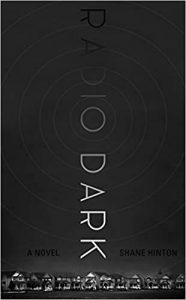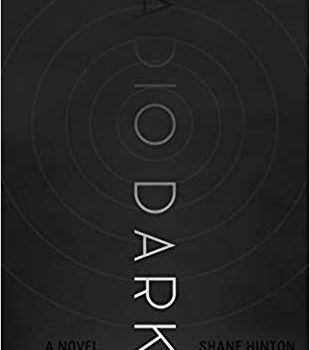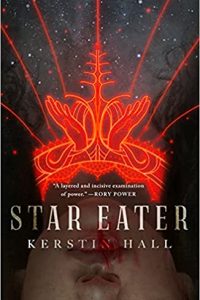Ian Mond Reviews Radio Dark by Shane Hinton
 Radio Dark, Shane Hinton (Burrow Press 978-1941681602, $16.99, 130pp, tp) August 2019.
Radio Dark, Shane Hinton (Burrow Press 978-1941681602, $16.99, 130pp, tp) August 2019.
Shane Hinton’s debut novel (really a debut novella) Radio Dark is a mostly run-of-the-mill post-apocalyptic story, but with an arresting image at is centre. From the long menu of end-of-the-world scenarios, Hinton chooses a condition – possibly a virus – that leaves people catatonic. Memphis, who works as a janitor at a local radio station, first comes across the disorder at the supermarket when a woman – “she shifted gently from foot to foot, indecisive” – refuses to budge when he tries to get milk out of the freezer. At work, the DJ notes how people are ringing into the station but are just breathing into the phone, refusing to hang up. It soon becomes apparent that this malady has efficiently swept through the town. When the power goes out, Memphis, the DJ, and Cincinnati, a Federal Communications Commission agent who is there to do an audit of the station, MacGyver themselves a radio tower from the bodies of the affected so they can send a message out to survivors.
They stacked for days, until the pile of bodies became a tower. The bodies were stacked so high they blocked out the afternoon sun.
The human radio tower – reminiscent of Cixin’s Liu’s human-computer in The Three-Body Problem – is a striking, memorable, gruesome image. Whether it’s scientifically possible or not, the execution is brilliant: both in the ingenuity of constructing the tower (lifting and balancing the bodies using pulleys) and in the chilling nature of its individual components, people who aren’t entirely dead but whose organs are slowly shutting down. Imagery like this is the reason why I read speculative fiction, the “wow-factor” that literary and mimetic fiction, for all its strengths, can’t match. But (and you knew this was coming) as much as I adored the radio tower and what it represents, I was less enamoured by the story that goes with it. The characters are lifeless and flat, not assisted by Hinton’s decision to refer to them by their function (DJ, the Pastor) or an American city (Memphis, Cincinnati). Memphis, in particular, has very little agency, generally following the lead of others (especially Cincinnati, whom he predictably forms an intimate bond with) until the very end where – no spoilers – he’s left with little choice but to determine his fate. The novel also has a nihilistic quality that I can appreciate, given how governments around the world seem quite prepared to let the planet burn, but does feel easy as a narrative choice. It’s not that I want my post-apocalyptic fiction to have a positive spin – I’m more than happy for it to be grim and miserable – but I do want it to say something more profound than “we are all stuffed.” While I might have reservations about Radio Dark, I won’t forget that radio tower in a hurry.
Ian Mond loves to talk about books. For eight years he co-hosted a book podcast, The Writer and the Critic, with Kirstyn McDermott. Recently he has revived his blog, The Hysterical Hamster, and is again posting mostly vulgar reviews on an eclectic range of literary and genre novels. You can also follow Ian on Twitter (@Mondyboy) or contact him at mondyboy74@gmail.com.
This review and more like it in the July 2019 issue of Locus.
 While you are here, please take a moment to support Locus with a one-time or recurring donation. We rely on reader donations to keep the magazine and site going, and would like to keep the site paywall free, but WE NEED YOUR FINANCIAL SUPPORT to continue quality coverage of the science fiction and fantasy field.
While you are here, please take a moment to support Locus with a one-time or recurring donation. We rely on reader donations to keep the magazine and site going, and would like to keep the site paywall free, but WE NEED YOUR FINANCIAL SUPPORT to continue quality coverage of the science fiction and fantasy field.








